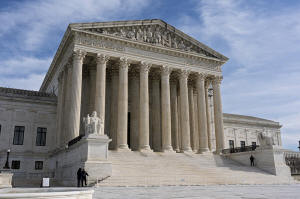Alito's dissent in deportation case says court rushed to block Trump
with middle-of-the night order
[April 21, 2025]
WASHINGTON (AP) — The Supreme Court acted “literally in the middle of
the night” and without sufficient explanation in blocking the Trump
administration from deporting any Venezuelans held in northern Texas
under an 18th-century wartime law, Justice Samuel Alito wrote in a sharp
dissent that castigated the seven-member majority.
Joined by fellow conservative Justice Clarence Thomas, Alito said there
was “dubious factual support” for granting the request in an emergency
appeal from the American Civil Liberties Union. The group contended that
immigration authorities appeared to be moving to restart such removals
under the Alien Enemies Act of 1798.
The majority did not provide a detailed explanation in the order early
Saturday, as is typical, but the court previously said deportations
could proceed only after those about to be removed had a chance to argue
their case in court and were given “a reasonable time” to contest their
pending removals.
“Both the Executive and the Judiciary have an obligation to follow the
law,” Alito said in the dissent released hours after the court’s
intervention against Republican President Donald Trump’s administration.
The justices’ brief order directed the administration not to remove
Venezuelans held in the Bluebonnet Detention Center “until further order
of this court.”
Alito said that “unprecedented” relief was “hastily and prematurely
granted.”

He wrote that it was not clear whether the Supreme Court had
jurisdiction at this stage of the case, saying that not all legal
avenues had been played out in lower courts and the justices had not had
the chance to hear the government's side.
“The only papers before this Court were those submitted by the
applicants. The Court had not ordered or received a response by the
Government regarding either the applicants’ factual allegations or any
of the legal issues presented by the application. And the Court did not
have the benefit of a Government response filed in any of the lower
courts either,” Alito said.
Alito said the legal filings, “while alleging that the applicants were
in imminent danger of removal, provided little concrete support for that
allegation.” He noted that while the court did not hear directly from
the government regarding any planned deportations under the Alien
Enemies Act in this case, a government lawyer in a different matter had
told a U.S. District Court in a hearing Friday evening that no such
deportations were then planned to occur either Friday or Saturday.
[to top of second column]
|

The Supreme Court is seen on Capitol Hill in Washington, Dec. 17,
2024. (AP Photo/J. Scott Applewhite, File)

“In sum, literally in the middle of the night, the Court issued
unprecedented and legally questionable relief without giving the
lower courts a chance to rule, without hearing from the opposing
party, within eight hours of receiving the application, with dubious
factual support for its order, and without providing any explanation
for its order,” Alito wrote. “I refused to join the Court’s order
because we had no good reason to think that, under the
circumstances, issuing an order at midnight was necessary or
appropriate. Both the Executive and the Judiciary have an obligation
to follow the law."
The administration has filed paperwork urging the high court to
reconsider its hold.
On Friday, two federal judges refused to step in as lawyers for the
men launched a desperate legal campaign to prevent their
deportation. Early Saturday, the 5th U.S. Circuit Court of Appeals
also refused to issue an order protecting the detainees from being
deported.
The ACLU had already sued to block deportations of two Venezuelans
held in the Bluebonnet facility and sought an order barring removals
of any immigrants in the region under the Alien Enemies Act.
In the emergency filing early Friday, the ACLU warned that
immigration authorities were accusing other Venezuelan men held
there of being members of the Tren de Aragua gang, which would make
them subject to Trump's use of the law.
It has only been invoked three previous times in U.S. history, most
recently during World War II to hold Japanese-American civilians in
internment camps. The administration contends it gives them the
power to swiftly remove immigrants they identified as members of the
gang, regardless of their immigration status.
Following the unanimous high court order on April 9, federal judges
in Colorado, New York and southern Texas promptly issued orders
barring removal of detainees under the law until the administration
provides a process for them to make claims in court.
But there had been no such order issued in the area of Texas that
covers Bluebonnet, which is 24 miles north of Abilene in the far
northern end of the state.
Some Venezuelans subject to Trump's use of the law have been sent
to El Salvador and housed in its notorious main prison.
All contents © copyright 2025 Associated Press. All rights reserved |